Renationalisation plans spark mixed reactions
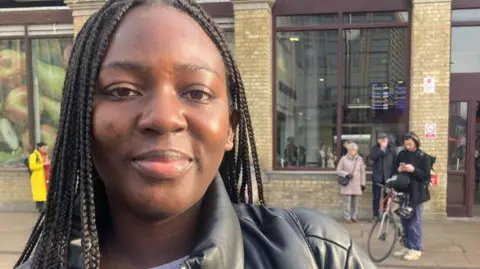 Mousumi Bakshi/BBC
Mousumi Bakshi/BBCTwo rail operators in the East of England will be the first to return to public ownership next year.
The government said c2c, which runs services in south Essex, would be renationalised in July, and Greater Anglia, which runs trains to Stansted Airport and London Liverpool Street, would follow in the autumn.
But what do commuters in Chelmsford and Cambridgeshire think - and how do they want services to change?
Many commuters told the BBC they hoped nationalisation will result in lower rail fares.
Student Janice Salima travels into Cambridge from Chelmsford several times a week and believes rail travel is still too expensive.
"I'm on the trains at least four times a week but I think they [fares] are really high," she says.
"If you don’t have a railcard, it's very bad for you.
"If there's a chance prices could go down, I don't mind who owns it."
'We need more efficient trains'
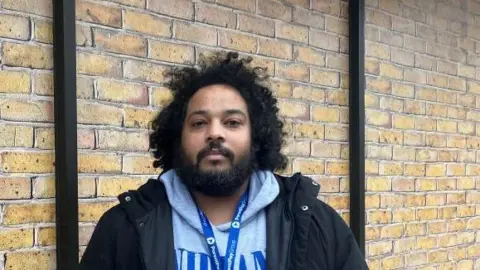 Henry Godfrey-Evans/BBC
Henry Godfrey-Evans/BBCGeorge Buka, 35, says he thinks privatisation has been "a bit of a mess" with prices increasing, delays and train driver strikes all making life more difficult for commuters.
"I want to see the fares decrease, much lower fares," he says.
He says people visiting the UK from the rest of Europe see train prices here as "a bit of a joke" because they are so high.
Mr Buka believes renationalisation could help improve the general reliability of the services too.
"[We need] more efficient trains, there are constant delays," he adds.
"People have probably lost jobs because they’ve been so late and delayed and struggled to get to their location."
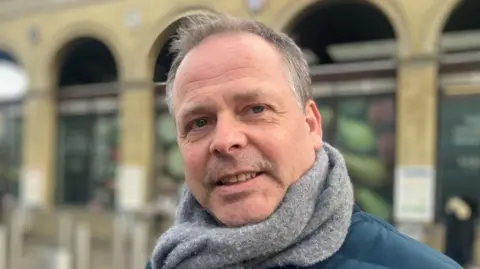 Mousumi Bakshi/BBC
Mousumi Bakshi/BBCJon Pennington uses trains primarily for work but says in his personal life, when he has to pick up the tab himself, the prices are off-putting.
"I think [fares] are pretty high but mostly I pay through work so it doesn’t affect me personally," he says.
"When we do look to travel by rail we do choose the car because once you add two or three people or a family it gets too expensive."
'Only shareholders benefit'
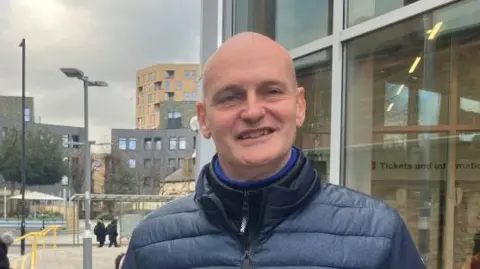 Henry Godfrey-Evans/BBC
Henry Godfrey-Evans/BBCActor Roger Bennett, 59, says he believes privatisation has "put money in the pockets of shareholders" rather than provide real benefits for customers.
"I think I’m hoping to see travel at a reasonable cost, services that run on time with formation of a train with the right number of carriages so you don’t end up with standing room only.
"That’s what I’m expecting - affordable travel, reasonable amount of services and people being kept informed, and an end to the endless litany by some train companies about why things don’t run."
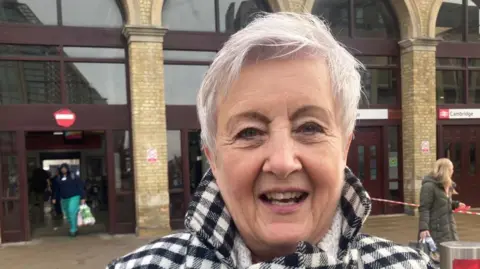 Mousumi Bakshi/BBC
Mousumi Bakshi/BBCJenny Payne believes things would be better if services "everyday people use" were not for profit.
"If the trains are going to run, they should run," she says.
"We live in Downham Market and we have one train an hour, so if that’s cancelled then that is a difficulty."
'Railways are the best in Europe'
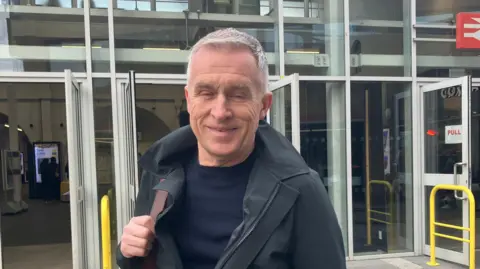 Henry Godfrey-Evans/BBC
Henry Godfrey-Evans/BBCSpeaking outside Chelmsford station, Tomas Pinas says he believes rail services in Britain are "one of the best" across Europe, especially compared to his native Norway.
"Trains are running here, everywhere, all the time," he says.
"[They are] very, very frequent and I think some minor delays but most things are solved very quickly.
"I think British railways and operators are top notch, best in Europe."
What does renationalisation mean?
Bringing both operators back into public ownership is part of Labour's wider plans to renationalise rail services as contracts either end or reach a break.
Under the existing system, Britain's railway lines are run by train-operating companies as franchises for a fixed length of time.
Northern Ireland's rail system has remained nationalised since 1948.
The Passenger Railway Services (Public Ownership) Act 2024, which passed last week, allows the government to act on its manifesto promise to take rail contracts back into public ownership in five years as each private franchise runs out.
The government also plans to set up a new arms-length body, Great British Railways (GBR), which will take over service contracts currently held by private firms as they expire in the coming years.
It wants GBR to eventually take over responsibility for maintaining and improving rail infrastructure from Network Rail.
What do rail operators say?
The managing director of c2c, Rob Mullen, said: "This does not create a change in focus for the team at c2c; we remain committed to our customers, communities and colleagues."
In a statement, Greater Anglia said it would work with the Department for Transport (DfT) to ensure a "smooth transition to public ownership" and services, timetables and station facilities would not be affected.
Follow East of England news on X, Instagram and Facebook: BBC Beds, Herts & Bucks, BBC Cambridgeshire, BBC Essex, BBC Norfolk, BBC Northamptonshire or BBC Suffolk.
